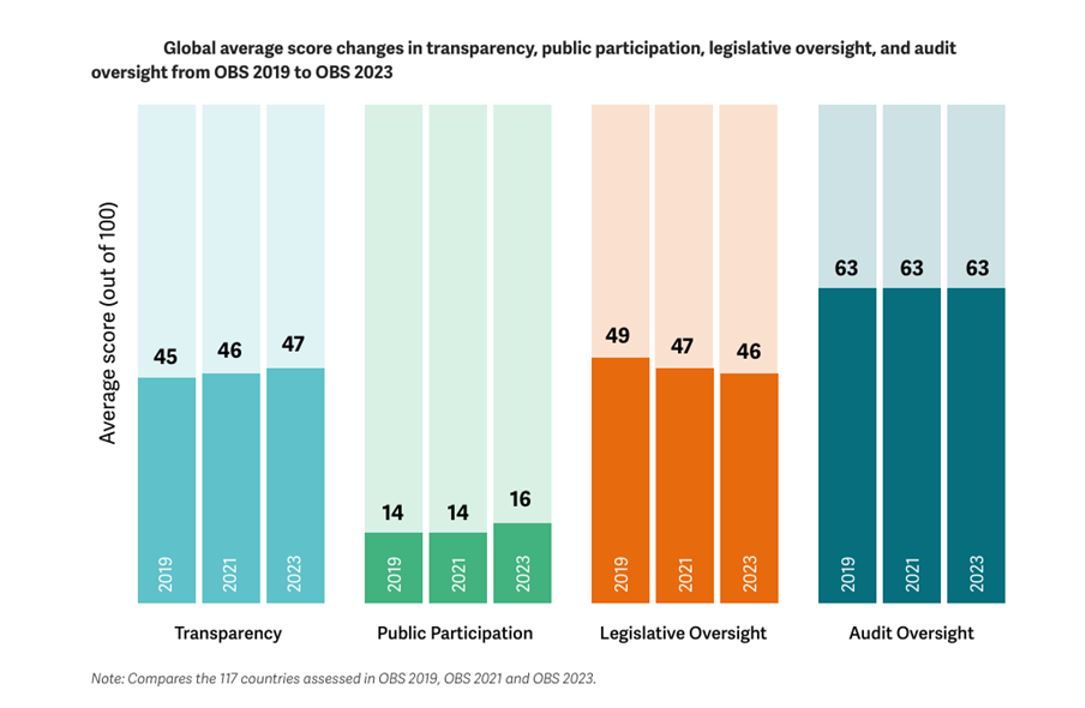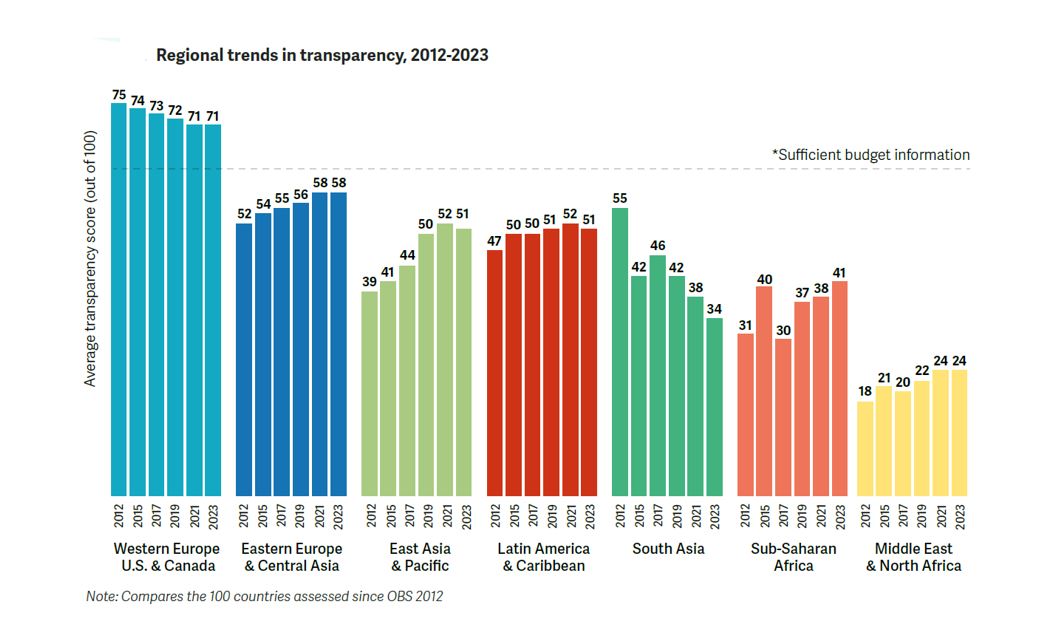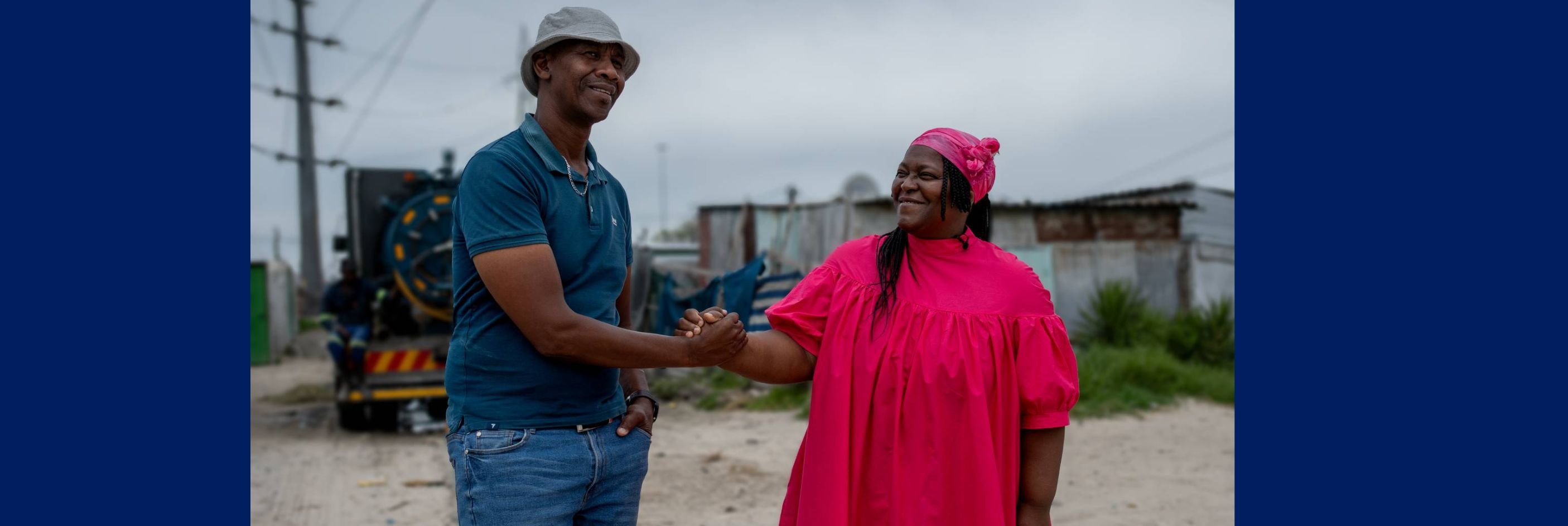The recent release of our Open Budget Survey 2023 – the ninth since 2006 – comes after several years of turbulence and a growing apprehension across the globe that the multidimensional challenges and shocks confronting countries are far from easing off. Many feel that the global economy is broken. The pandemic, inflation, conflicts and instability, growing global debt, and increasing effects of climate change have led to significant setbacks, with the most marginalized often being the most affected. In many countries, the social contract binding governments with their public is brittle, as millions of people around the world lose faith in the ability of their governments to rise to challenges and succeed.
How governments raise, spend, and borrow through their budget will be critical in responding to the urgent challenges they face. Governments need to be more honest, open and inclusive with the public about how they are managing public resources, and this has an essential role in righting the government-public dynamic. There are many benefits of increased fiscal openness — like lower borrowing costs and higher revenue generation. At the International Budget Partnership (IBP), we have always believed firmly in the power of an open and accountable budget. When the government lets the public into these very consequential decisions it bolsters trust in their ability to deliver what people need.
This belief has driven our work on the Open Budget Survey (OBS) – the world’s only independent, comparative, and regular measure of budget openness and accountability around the world. With the OBS, our goal is to catalyze reforms to make national budgeting processes have better levels of transparency, more inclusive public participation, and more robust oversight.
The OBS research process embodies the spirit and values of our worldwide network of open budget champions. It is a locally led collective undertaking by civil society researchers and advocates, peer reviewers, and government reviewers. This latest round is our biggest one yet – assessing 125 countries, which are home to 95% of the world’s population and had budgets totaling more than $33.5 trillion in spending in Fiscal Year 2022 alone.
The findings of the OBS 2023 show that, across the different pillars that we assess, there is a mix of performance and diverging paths, with more progress both necessary and possible.
Over the past several years, there has been slow, incremental improvements globally on budget transparency, though on average it is still far below the level of budget information that can support meaningful dialogue. Public participation in government budgets remains the weakest link, although examples of innovative and inclusive practices can be found across incomes, regions, and systems. Worryingly, the decline in legislative oversight that we have been tracking since the pandemic has continued. Fewer legislatures approve the budget on time, examine in-year budget execution, and examine the audit report, as compared to before the pandemic. Audit oversight has remained adequate over that time, although crucial gaps – particularly around follow-up to audit recommendations – continue to threaten accountability.

When we look at regional averages of budget transparency over the last dozen years, it becomes clear that some regions are faring better than others. Clear progress in Eastern Europe & Central Asia, East Asia & the Pacific, Latin America & the Caribbean, and Sub-Saharan Africa contrasts with a significant fall in South Asia, stagnation in Western Europe and the US, and continued low performance in the Middle East & North Africa, albeit improving over time.

Beyond these averages, the OBS can also reveal detailed information on the comprehensiveness of budget information published by governments. With half the world living in countries that spend more on debt payments than on health or education, the OBS finds most countries fall short on providing critical information around debt, taxes, and fiscal risks in their budgets. When it comes to tax expenditures – the foregone revenue from tax concessions – only 16% of governments provide a policy rationale, estimate of revenue loss, and the intended beneficiaries. Only 11% of Executive Budget Proposals include a longer-term projection of fiscal sustainability that covers a period of at least 10 years.
Some countries, across different regions and levels of development, have continued to shine the light for others to replicate:
- Tanzania’s new government worked with civil society and key development partners to identify missing budget information and jointly develop a roadmap for reform.
- Moldova’s Ministry of Finance improved the disclosure and use of budget information to illustrate how they were handling the social and economic spillover effects of the war in neighboring Ukraine.
- In the Dominican Republic, public hearings at the local level provide a space for people to identify investments that are needed in their communities. These ideas are then fed into the national budget, with the government posting on a website how the requests have been integrated.
- In The Gambia, the Ministry of Finance, the National Assembly, and the National Audit Office have found innovative ways to engage the public throughout the budget process.
These bright spots illustrate that progress is possible everywhere, but most countries must do more to publish more information and engage their public throughout the budgeting process. We found that 83% of countries use at least one channel to engage the public, with most governments doing so in the early stages of the budget process. Fewer governments, however, engage their publics during implementation. This leaves the public out of the conversation right when they are most needed to ensure budget promises are delivered.
The latest findings of the OBS show that governments can leverage budgets as a powerful tool to engage their public and address challenges head on. To do so, governments must open public debate and scrutiny around how public resources are raised and managed and whether they are being leveraged to close socioeconomic gaps and inequities. Communities that have been historically marginalized need to be brought into the deeply consequential decision-making that determines whether they can access the resources and services that they need to thrive. In doing so, governments can tackle structural exclusion, restore people’s faith in public institutions, and overcome challenges.




